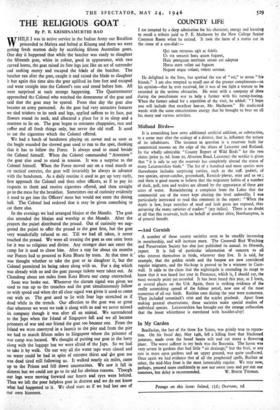THE RELIGIOUS GOAT .
By P. B. KRISHNAMURTIII RAO
WHILE I was in active service in the Indian Army our Batallion proceeded to Malaya and halted at Kluang and there we were getting fresh mutton daily by sacrificing fifteen Australian goats. One day it happened that while the butcher was ready to slaughter the fifteenth goat, white in colour, good in appearance, with two curved horns, the goat raised its fore legs just like an act of surrender and seeking mercy and escaped the blade of the butcher. The butcher ran after the goat, caught it and raised the blade to slaughter it but again this time also the goat uplifted its fore feet and escaped and went straight into the Colonel's tent and stood before him. All were surprised at such strange happening. The Quartermaster approached the Colonel who watched the demeanour of the goat and said that the goat may be spared. From that day the goat also became an army personnel. As the goat had very attractive features we tied trinkets to its neck and legs, applied saffron to its face, put flowers round its neck, and allocated a place for it to sleep and a mattress to lie on. The goat began to consume chappaties, rice and coffee and all fresh things only, but never the old stuff. It used to eat the cigarettes which the Colonel offered.
We had a batch of bandsmen playing on surnai and as soon as
the bugle sounded the shrewd goat used to run to the spot, thinking that it has to follow the Force. It always used to stand beside the Colonel himself. When the Colonel commanded "Attention" the goat also used to stand in tension. It was a surprise to the Colonel himself. When the Force moved out on a road march or on tactical exercise, the goat will invariably be always in advance with the bandsmen. As a daily routine it used to get up very early, first approach the Colonel and then other officers, as if to pay its respects to them and receive cigarettes offered, and then straight go to the mess for the breakfast. Sometimes out of curiosity evidently it used to get into the Officers' mess but would not enter the dining hall. The Colonel had ordered that it may be given something to eat there also.
In the evenings we had arranged bhajan at the Mandir. The goat also attended the bhajan and worship at the Mandir. After the prayers the pujari distributed the prasad. Out of curiosity we sug- gested the pujari to offer the prasad to the goat first, but the goat very wonderfully refused to eat. Till we had all taken, it never touched the prasad. We were all treating the goat as one saint born for it was so religious and divine. Any stranger dare not enter the camp for it used to chase him. After a stay for about six months our Forces had to proceed to Kota Bharu by train. At that time it was thought whether to take the goat or to slaughter it, but the Colonel permitted its being taken along with us. For a dog which was already with us and the goat passage tickets were taken out. At Chandong about ten miles from Kota Bharu our camp entrenched.
Soon war broke out. Whenever the alarum signal was given we
used to run up to the trenches and the goat simultaneously follow us with speed and when the all clear signal was given it used, to come out with us. The goat used to lie with four legs stretched as if dead while in the trench. Our affection to the goat was so great that wherever we went we took it along with us and we never missed its company though it was after all an animal. We surrendered to the Japs when the Island of Singapore fell and we all became prisoners of war and our friend the goat too became one. From the Island we were conveyed in a launch to the pier and from the pier we had to march fifteen miles to Singapore where the prisoner of war camp was located. We thought of putting our goat in the lorry along with the luggage but we were afraid of the Japs. So we had to take it by walk. On our way all the water taps were closed and no water could be had in spite of extreme thirst and he goat too was dead tired still following us. It walked nearly six miles, came up to the Prison and fell down unconscious. We saw it fall in distress but we could not go to its aid for obvious reasons. Though our legs were moving forward our hearts and eyes were behind. Thus we left the poor helpless goat in distress and we do not know what had happened to it. We shed tears as if we had lost one of our own kinsmen.


























 Previous page
Previous page